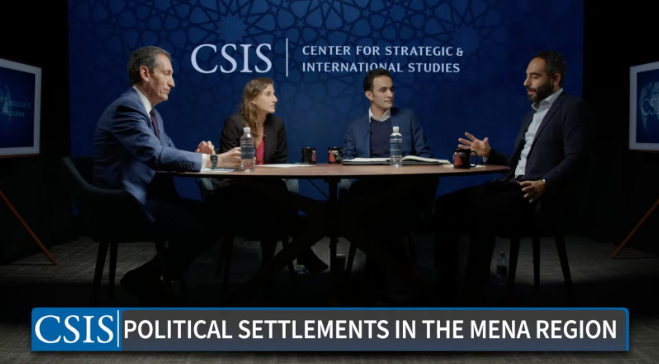Stability vs. Accountability: The Cost of Political Settlements in the MENA Region
Experts from CSIS and Chatham House discuss the political settlements in the MENA region on Oct 18, 2023
Key Points
The price of elite bargains in pursuit of stability is accountability, structural violence, replaced gun wars, becomes the new cause of death
Current political settlements in the Middle East reward elite impunity, with the side effects being felt by the suffering population
The Middle East needs regional leadership to create solidarities to overcome the limitations of elite bargains and promote lasting peace
The Center for Strategic and International Studies hosted a panel on Oct 18, 2023, to discuss how political settlements or elite bargains have become the main means of conflict resolution in the Middle East and North Africa, and a potential way forward. A recent report from Chatham House argues that these settlements have not resolved the region's conflicts and that prioritizing stability over accountability has only exacerbated corruption and inequality in the region. With this in mind, a panel of industry experts and researchers rethink how this has played out in the region. The talk was moderated by the Director of the Middle East Program at CSIS, Jon Alterman.
First, the Senior Research Fellow of Chatham House’s Middle East and North Africa Programme, as well as the co-author of that report, Renad Mansour, discussed the role of stabilization as a foreign policy and development tool for the US and European countries going into the MENA Region. The trade-off of stability, he pointed out, is accountability.
Renad Mansour stated that elite bargains, a more pragmatic approach that brings all the elites together and incentivizes them to become part of the tent, is now the new tool in stopping civil wars, notably in Iraq. However, while these political settlements effectively stopped casualties from civil war, they perpetuated more casualties less visually through structural violence. He emphasized that corruption of elite bargains, instead of gun wars, has become a new cause of human death, such as fewer medical resources and lower fertility rates.
Next, Natasha Hall from CSIS’s Middle East Program spoke about elite bargains being a tool for rewarding impunity in Syria and Jordan. She pointed out that as human beings are naturally more attracted by the outbreak of violence, the Middle East is more defined by the silence where people are trying to survive in those broken systems where elites are entrenched and become too big to fail. Farea Al-Muslimi from Chatham House joined the conversation and noted that similar problems can be applied to nearly all the countries in the MENA region. He pointed out that elite bargains always park on the side of accountability, and elite deals remain the tool for resolving conflicts.
By staying above the roof of the law and keeping impunity, Renad Mansour argued that these States are designed more of an arena, where “different groups rely on their coercive apparatus and arms to negotiate politically.” He gave an example of firing a missile on a city, not designed to kill anyone but designed to negotiate. “Violence is politically inclusive,” Renad stated, “because it is a part of the elite bargain. They have agreed that violence can be deployed to negotiate within the confines of the agreement for the system.” Natasha Hall expressed her concern about the current situation since by challenging the status quo, people are also challenging the very embedded and dangerous vested interests that have capitalized on the status quo. Applying this to Gaza which is likely to have political reconstruction, Natasha pointed out that the US administration needs to acknowledge that the normalization of Arab countries with Israel does not resolve the underlying structural violence, but continues the transactional elite bargains.
Lastly, Farea Al-Muslimi emphasized the imperative for the nations within the region to assume a greater role in regional leadership, recognizing that peace is fundamentally intertwined with the realm of perception. In the prevailing landscape, there exists a misconception that the mere presence of influential actors can comprehensively resolve intricate regional issues, leading to an illusion of omnipotence on their part. However, the ongoing brutal divisions prove such a perception to be wrong. Al-Muslimi underscored that the true essence lies in cultivating collective solidarities and fostering constructive dialogues around overarching themes. This collective approach enables the people within the region to transcend the limitations of elite bargains and pave the way for a harmonious, stable, and prosperous future.
This report was compiled by Zhe Yuan on October 30, 2023, and edited by Alexis Tretschok.

